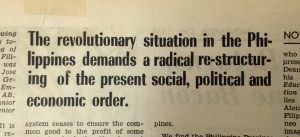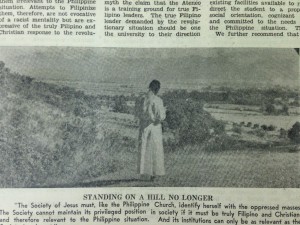The following text is a manifesto by Ateneans Jose Luis A. Alcuaz, Gerardo J. Esguerra, Emmanuel A. F. Lacaba, Leonardo Q. Montemayor and Alfredo N. Salanga, published in The GUIDON, Vol. XXXV, No. 9, on November 27, 1968.
Montemayor and Lacaba became editors of The GUIDON during their stay in the university.
Filipinization is relevance. It is the process of making things relevant to the Philippine situation.
A revolutionary situation exists in the Philippines because the present social, political and economic order does not make for a just society. These are self-evident. That a power elite controls government for its own interests over and above those of the great majority of our countrymen. And this same power elite maintains an unequal distribution of the nation’s wealth, which action is unjust because of the great disparity existing between the rich and the poor.
We cannot but condemn the power elite that has appropriated unto itself the fruits of the country’s economic resources. We cannot but condemn the artificial two-party system that seeks to promote and safeguard the vested interests of the power elite. It is this order that the power elite seeks to maintain, an order that does not make for a just society, an order that has led to the revolutionary situation in the Philippines.
Towards a Just Society
 The primary goal set before us then is national development towards the ordering of a just society. A just society is one that makes available for all the means for the full development of the human person. The situation being revolutionary, national development demands a new orientation which calls for the democratization of political and economic power, and a more intensified involvement of the citizenry in the life of the nation. National development must mean a radical restructuring of the present social, political and economic order so that each and every Filipino shall be ensured of his rightful participation and his just share in the fruits of his own society’s labor.
The primary goal set before us then is national development towards the ordering of a just society. A just society is one that makes available for all the means for the full development of the human person. The situation being revolutionary, national development demands a new orientation which calls for the democratization of political and economic power, and a more intensified involvement of the citizenry in the life of the nation. National development must mean a radical restructuring of the present social, political and economic order so that each and every Filipino shall be ensured of his rightful participation and his just share in the fruits of his own society’s labor.
This new orientation is truly Filipino because it addresses itself to the masses that seek justice, and not to the power elite that impedes its promotion. And because it speaks of real justice, it cannot but be truly Christian. Thus, to be truly Filipino is to be truly Christian. Love of neighbor does not exist in paternalistic donations, which are mere palliatives for our society’s ills. Rather, it is a rendering of justice, a commitment to cure society’s ills at its roots.
The condemnation of the present social, political and economic order that does not make for a just society is therefore a Christian duty. The commitment to national development for the ordering of a just society is a Christian commitment.
Imperialism of Money
Towards this end, we deplore the silence and inactivity of the Philippine Church regarding the revolutionary situation we find ourselves in. The Church in the Philippines has failed to exert her moral authority. We find her wedded to the “imperialism of money” condemned by the papal encyclical, Populorium Progressio. This is all the more deplorable in view of the fact that she has aligned herself with and become dependent on the very power elite that has brought about this revolutionary situation.
We find the statement on Gospel and Revolution drawn up by sixteen bishops of the Third World of Underdeveloped Nations particularly relevant to the position of the Philippine Church in the present revolutionary situation: “In what is permanent and essential, namely her faithfulness to and communion with Christ in the Gospel, the Church is never in the pay of political, economic and social systems. As soon as a system ceases to ensure the common good to the profit of some party involved, the Church must not merely condemn such injustice, but dissociate herself from the system of privilege, ready to collaborate with another that is better adapted to the needs of the time, and more just.”
The Church must make herself relevant to the Philippine situation, even as the Philippine situation must be made more relevant to the oppressed masses of the Filipino people. For it is the very oppression of the masses by the power elite that creates this revolutionary situation. The choice before us is not whether we are going to have a revolution. The choice is whether the revolution shall be violent or non-violent. Clearly enough, the better response to the revolutionary situation must be both Filipino and Christian.
That the Philippine Church is involved in an educational apostolate makes us conscious of the role of the university in an underdeveloped society, a decisive factor in the revolutionary situation we are in. In particular, we are concerned with the roles of the Philippine Province of the Society of Jesus and of the Ateneo de Manila University, and the attempt to Filipinize these institutions.
Unfinished Revolution
 In attempting to analyze their roles, however, we cannot but maintain that, owing to their privileged positions in our society, all these institutions properly belong within the structure of the power elite. It is basically a neo-colonial structure, as the economist Gunnar Myrdal points out in his Asian Drama: An Enquiry into the Poverty of Nations: “American political patterns laid over Spanish colonial traditions served to reinforce and legitimize in a modern democratic framework the hierarchical power structure created under the aegis of Spain.” It is the very same oppressive structure that the Philippine Revolution of 1896 sought to overthrow.
In attempting to analyze their roles, however, we cannot but maintain that, owing to their privileged positions in our society, all these institutions properly belong within the structure of the power elite. It is basically a neo-colonial structure, as the economist Gunnar Myrdal points out in his Asian Drama: An Enquiry into the Poverty of Nations: “American political patterns laid over Spanish colonial traditions served to reinforce and legitimize in a modern democratic framework the hierarchical power structure created under the aegis of Spain.” It is the very same oppressive structure that the Philippine Revolution of 1896 sought to overthrow.
We, therefore, maintain that the present alignment of these institutions with the power elite makes them irrelevant to the Philippine situation. Attempts to Filipinize them, therefore, are not evocative of a racist mentality but are expressive of the truly Filipino and Christian response to revolutionary situation in the Philippines.
We find the Philippine Province of the Society of Jesus existing under privileged conditions in our society. Their way of life, organizational structure and the institutions that they maintain are totally dependent on the power elite. The Society of Jesus, then, must, like the Philippine Church, identify herself with the oppressed masses. The Society cannot maintain its privileged position in society if it must be truly Filipino and Christian, and therefore relevant to the Philippine situation. And its institutions can only be as relevant as the Society is relevant.
Mythical Leaders
In view of the revolutionary situation, the Society and its institutions must undergo a renewal in the spirit of the Rio de Janeiro statement of May 1968. In the letter of the Fathers Provincial of the Society of Jesus in Latin America to Latin American Jesuits is contained the spirit of this renewal: “We expect you all to seize the initiative in stripping away–in the spirit of true abnegation–all forms expressive of an aristocratic or bourgeois mentality which could have influenced some of the past policies we have taken in public, in our way and manner of life, in the choice of our public, in the way we have treated our lay collaborators, in our dealings with the privileged classes.”
Likewise, the Ateneo de Manila University, which the Society maintains and operates, must undergo the same renewal. We find the Ateneo today irrelevant to the Philippine situation because it can do no more than service the power elite. Its academic community is unresponsive to the needs of the Philippine standards and conditions. We, therefore, maintain that the Ateneo, as a university, has not exercised its moral and intellectual obligations of service to the oppressed masses but instead has catered exclusively to the oppressive power elite.
Project People’s Image
 We condemn as preposterous myth the claim that the Ateneo is a training ground for true Filipino leaders. The true Filipino leader demanded by the revolutionary situation should be one who is oriented to serving the oppressed masses of his countrymen. Dean Jeremias Montemayor, in his Address to the 1968 Jesuit Educational Association Convention, precisely states, “Herein lies the greatest problem of the Ateneo in its attempt to train Filipino leaders today. The Ateneo does not project the true image of the Filipino people, nor does it really attempt to do so. It does not inculcate in its students the desire to discover that image or to make them aware of the need of discovering it.” This is because the education that the university provides is, to a large extent, Westernized.
We condemn as preposterous myth the claim that the Ateneo is a training ground for true Filipino leaders. The true Filipino leader demanded by the revolutionary situation should be one who is oriented to serving the oppressed masses of his countrymen. Dean Jeremias Montemayor, in his Address to the 1968 Jesuit Educational Association Convention, precisely states, “Herein lies the greatest problem of the Ateneo in its attempt to train Filipino leaders today. The Ateneo does not project the true image of the Filipino people, nor does it really attempt to do so. It does not inculcate in its students the desire to discover that image or to make them aware of the need of discovering it.” This is because the education that the university provides is, to a large extent, Westernized.
We, therefore, cannot help but call attention to the preponderant American presence in the Society and in the University. We cannot but trace the roots of the irrelevant Western orientation of the university to their direction and influence while still acknowledging the unimpeachable character of their good intentions. But precisely the spirit of renewal called for involves the need to divorce the Society and university from their overdependence on the neo-colonial, Western education. And this is the task that must be left in the hands of the most nationalistic Jesuits and laymen.
On the other hand, we also acknowledge the fact that there exists a shortage of manpower resources within the Society. But we should not, on the other hand, condone this situations but instead search for possible solutions that will decrease to a large extent, the Society’s dependence on American Jesuit presence.
Right to Make Own Mistakes
We recommend the serious study of whether it will be feasible to close down the existing Ateneo educational institutions in Naga, San Pablo, Davao and Zamboanga, and to concentrate Filipino Jesuit manpower in Manila and Xavier University. We recommend the dissolution of the University Development Committee, which seeks to expand the physical plant of the university. It may be food to restate that we are not seeking to develop the Ateneo on a level with Western universities. Nor are we primarily seeking graduates capable of being accepted in the best graduate schools abroad but instead graduates who are capable of solving Philippine problems based on Philippine standards and conditions; the more important task being to use existing facilities available to redirect the student to a proper social orientation, cognizant of and committed to the needs of the Philippine situation. The present physical plant of the university is sufficient for this purpose.
We recommend that future policies of the university be determined entirely by Filipino Jesuits and laymen; and, therefore, that the relationship between the university and its American Jesuit staff be guided by this principle. That the American Jesuits in the university remain only insofar as they are in conscience agreeable to the policies laid down by the Filipino Jesuits and laymen.
We recommend a drastic reorientation of the present curriculum. Not for the addition of more subjects but for the reorientation of present courses. That Theology be taught in light of the papal social encyclicals and the documents of Vatican II with particular emphasis on the Christian response to the needs of the Philippine situation. That the present course on the Introduction to the Social Sciences be converted into a course on the Philippine Social Problems, which course shall endeavor to bring the students into closer contact with the masses. That the present courses in English Literature be converted into courses on Philippine Literature in English and in Tagalog. That economics, history and political science courses be taught entirely by Filipinos. That greater effort be made in all other courses, especially through field work, to bring the students into closer contact with the masses by having them apply their classroom theory to actual Philippine problems.
Filipino Rector and Dean
We recommend that the lay and Jesuit faculty make a conscious effort to restructure their courses in order to make these more relevant to Philippine situation, whenever possible.
We recommend that the faculty involve themselves directly with the Philippine situation by taking positions on Philippine problems. We have noted with great dismay, how so much learning on their part has not been put to use in the service of the nation–through the exercise of their right of citizens’ action and influence.
We further recommend that a Filipino Rector and a Filipino Dean be appointed as soon as possible; not only as a primary step to eventual Filipinization but also as a symbolical gesture of the university’s commitment to Filipinization. As much as Father Provincial’s appointment was a significant step toward full independence of the Philippine province, surely, the appointment of Filipinos to these positions can be a significant indication of whether the university is really committed to Filipinization. And this much we can assume: That there are qualified Filipino Jesuits who can be appointed to these positions.
Sincere Communal Effort

STANDING ON A HILL NO LONGER. “The Society of Jesus must, like the Philippine Church, identify herself with the oppressed masses. The Society cannot maintain its privileged position in society if it must be truly Filipino and Christian, and therefore relevant to the Philippine situation. And its institutions can only be as relevant as the Society is relevant.”
The student body, being an integral part of the university community, also has its own functions to fulfill.
We call for a re-evaluation of all existing extracurricular activities based on the guidelines set forth in this statement. We call on the student council to re-examine its present orientation, functions and organizational structure in order to better gear itself to the process of Filipinization.
Let it not be said that Filipinization is a process initiated from the top; let it be rather known that Filipinization bespeaks of communal effort, a process brought about by the university as a community.
We, therefore, urge the whole university community to address itself to the problem and to face it squarely. Let us look deep into our hearts and ask ourselves if we are really willing to pay the price in terms of personal and communal sacrifices. May we all have the courage to carry on an authentic Christian renewal in the spirit of true love and justice.
Editor’s Note: The following paper is a preliminary study towards a better understanding of the nature and challenges of Filipinization in the Ateneo. It was prepared by five Ateneans: Jose Luis A. Alcuaz, junior A.B; Gerardo J. Esguerra, junior AB; Emmanuel A. F. Lacaba, junior A.B; Leonardo Q. Montemayor, junior B.S. and Alfredo N. Salanga, senior A.B.








[…] propositions could happen, however, we must ask ourselves the question we were once asked in the “Down from the Hill” manifesto: Are we willing to pay the price in terms of personal and communal sacrifices? As the Sanggunian […]